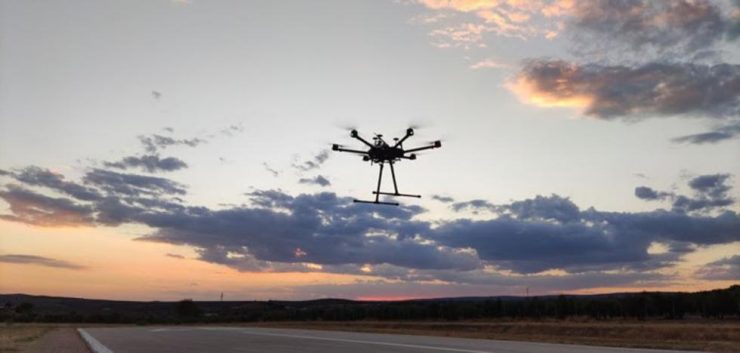The ATLAS experimental flight centre, located in Jaén, Spain, hosted a flight test campaign of up to nine drones in order to advance in the definition of noise certification procedures for this type of aircraft in early September. These tests are part of a research contract signed by the Andalusian consulting and engineering firm ANOTEC with the European Aviation Safety Agency, EASA, according to local news service Ideal.
In the tests carried out at ATLAS, different variants of flight and instrumentation procedures were investigated in order to evaluate the most practical solution, weighing factors such as precision, cost and repeatability. Measurement equipment included: on the ground 6 microphones, 2 meteorological stations and 3 high-resolution digital cameras that allowed the drones to be located independently, as well as on the aircraft themselves. The aircraft were also equipped with precision positioning systems and professional navigation and control systems, to ensure minimum deviation from the desired trajectory for optimal measurement by the deployed microphones.
Added to the technological complexity of these tests was the logistical challenge of having 9 drones available and instrumented at the scheduled time, provided by five different operators. Drone operators included: CATEC with two multirotor platforms and one with a fixed wing; AERTEC with its TARSIS 75 Kg fixed wing platform; Alpha Unmanned Systems with its Alpha 800 helicopter, and Quaternium with its Quaternium Hybrix hybrid engine multirotor platform.
The ATLAS flight centre has the possibility of segregating an airspace of 1050 km2 up to 5,000 feet in height in a sparsely populated area. This allows obtaining the flight permits that are required to be able to carry out more complex operations out of the pilot’s line of sight, such as those required by larger aircraft (such as the Tarsis-75, in this case).
Thanks to the results obtained by the ANOTEC company, a test was developed and positively evaluated that will support noise certification for drones and a description of common flight procedures for all types of unmanned platforms for the measurement of noise levels.
In the coming months, it is expected that these first results will be reinforced by new flight campaigns through which it is expected to develop a standard procedure for the certification of noise of all drone operations.
For more information visit:




